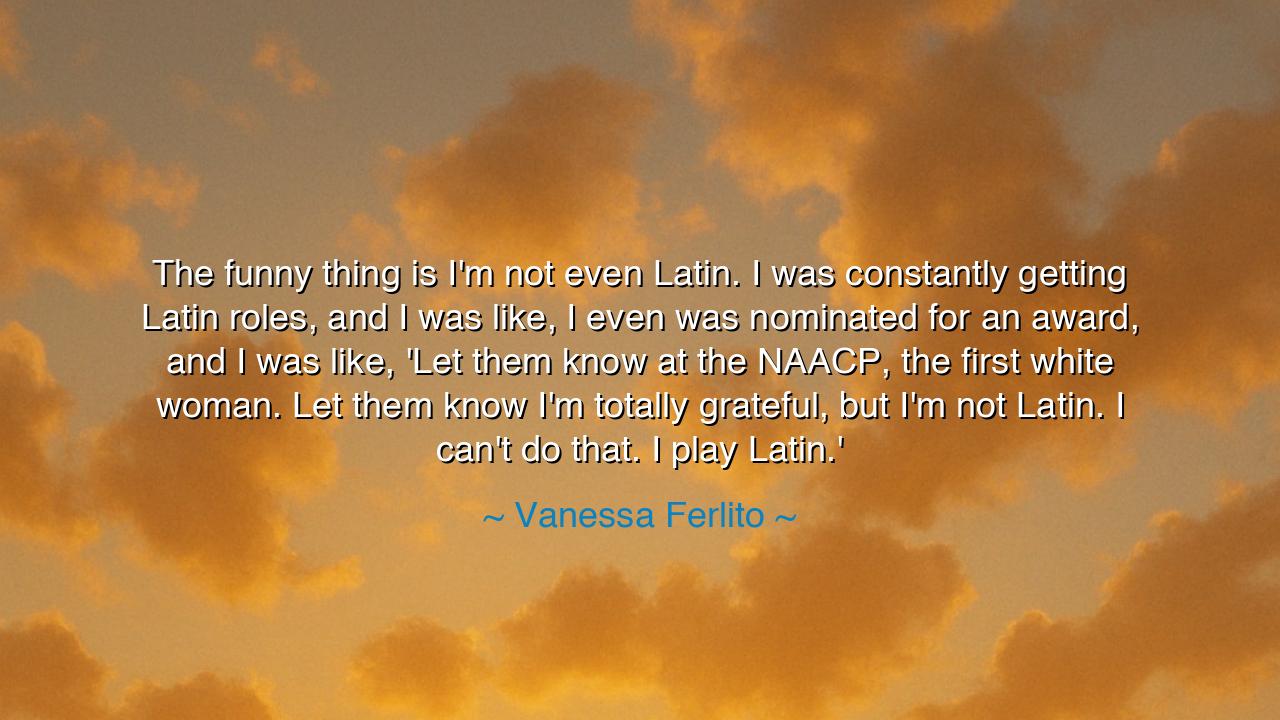
The funny thing is I'm not even Latin. I was constantly getting
The funny thing is I'm not even Latin. I was constantly getting Latin roles, and I was like, I even was nominated for an award, and I was like, 'Let them know at the NAACP, the first white woman. Let them know I'm totally grateful, but I'm not Latin. I can't do that. I play Latin.'






In the candid and reflective words of Vanessa Ferlito, “The funny thing is I’m not even Latin. I was constantly getting Latin roles, and I was like, I even was nominated for an award, and I was like, ‘Let them know at the NAACP, the first white woman. Let them know I’m totally grateful, but I’m not Latin. I can’t do that. I play Latin,’” there lies a meditation on identity, perception, and authenticity. Beneath her humor dwells a deep truth about how the world often sees not who we are, but what it expects us to be. Her tone, filled with humility and irony, reveals the eternal struggle between one’s inner truth and the labels that others impose.
In her words, Ferlito confronts the illusion of appearance — how the outer image can overshadow the spirit that lives within. Her experiences in the world of acting become a mirror to society itself, where people are so often defined not by essence, but by assumption. When she says, “I play Latin,” she acknowledges the artistry of transformation — that an actor can step into the life of another, embody their story, honor their culture — but she also draws a sacred line between representation and truth. To play is not to be. She does not claim what is not hers. Therein lies her integrity: she accepts the misunderstanding with grace, yet she does not let it become her truth.
This theme of mistaken identity has echoed through the ages. The ancients told of Odysseus, who wore many disguises to survive his long journey home. He was a beggar before the proud, a soldier among strangers, a shadow in his own house — and yet, beneath every mask, he remained himself. His greatness lay not in deception, but in knowing who he was even when others did not. So too does Vanessa Ferlito’s statement remind us that to live authentically, one must not be consumed by others’ perceptions. The world may misname you, but the wise hold fast to their truth.
There is also humor and humility in her voice, which tempers the weight of her words. She laughs not to dismiss the misunderstanding, but to rise above it. Her laughter becomes a shield — a way to find light in confusion, to transform error into grace. It is as though she says: “You may see what you will, but I know who I am, and I can smile at the irony of your vision.” This laughter is wisdom’s sister, for the wise do not rage against every misconception — they observe, they clarify, and they keep walking. In that way, she embodies the balance of clarity without bitterness, of truth delivered with warmth.
The story she tells also touches the sacred question of representation — how art can both illuminate and obscure identity. To be given roles that are not one’s own can be both an honor and a challenge. It reveals how powerfully art can shape perception, how easily fiction can bleed into belief. When Vanessa says she was “constantly getting Latin roles,” she reveals how the world often prefers to place people in comfortable boxes, rather than look deeper. Yet she, in naming this truth, restores the boundary between performance and reality — reminding us that art is imitation, not identity, and that respect for truth must always guide creation.
Consider too the life of Charlton Heston, who played Moses, a Hebrew prophet, though he was not of that lineage. His performance inspired millions, but he himself admitted that playing another’s truth required reverence and humility. So it is with Ferlito: she acknowledges the beauty of the roles she played, but she also insists on honesty — that gratitude does not mean silence when mistaken identity arises. Her integrity becomes a form of artistry in itself. She honors both the culture she portrays and the truth of her own self, and thus embodies the rare virtue of respectful authenticity.
From her words, we learn a powerful lesson: the world may misname you, but you must never misname yourself. Whether in art, in work, or in life, remain grounded in truth. Be grateful for what others see in you, but do not let their vision replace your own. Correct gently, laugh often, and live sincerely. For to know oneself is to possess unshakable freedom.
And so, Vanessa Ferlito’s quote becomes not just an anecdote about acting, but a parable for the ages. It teaches us that to live truthfully in a world of masks is both an art and a virtue. It reminds us to honor who we are, even when the world mistakes us for someone else. And it leaves us with this quiet, shining truth: authenticity is the highest form of grace — for the one who knows themselves deeply can play any role in life, yet never forget the soul beneath the costume.






AAdministratorAdministrator
Welcome, honored guests. Please leave a comment, we will respond soon